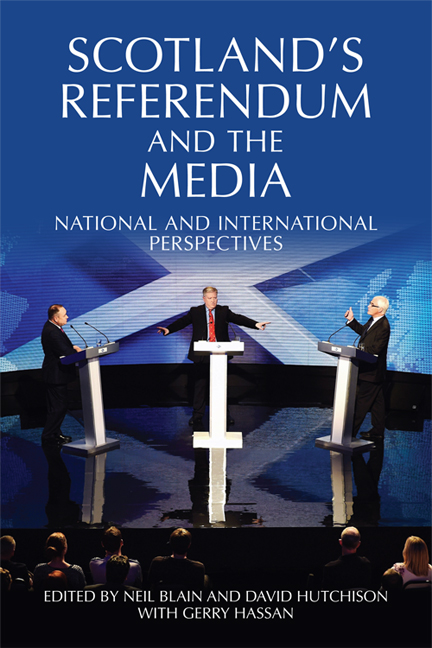Book contents
- Frontmatter
- Contents
- Preface
- Part One The Referendum in Scotland
- 1 The Unexpected Campaign
- 2 The Media Landscape in Scotland
- 3 Broadcasting and the Press: Some Key Moments
- 4 Scotland's Changing ‘Community of the Communicators’: The Political Commentariat and the Independence Referendum
- 5 The Scottish Press Account: Narratives of the Independence Referendum and its Aftermath
- 6 Scottish TV Coverage of the Referendum Campaign from September 2012 to September 2014
- 7 ‘Liked’, ‘Shared’, Re-tweeted: The Referendum Campaign on Social Media
- 8 Sport, Gender and National Identities
- Part Two Views from the UK
- Part Three International Perspectives
- Notes on the Contributors
- Index
2 - The Media Landscape in Scotland
from Part One - The Referendum in Scotland
Published online by Cambridge University Press: 05 August 2016
- Frontmatter
- Contents
- Preface
- Part One The Referendum in Scotland
- 1 The Unexpected Campaign
- 2 The Media Landscape in Scotland
- 3 Broadcasting and the Press: Some Key Moments
- 4 Scotland's Changing ‘Community of the Communicators’: The Political Commentariat and the Independence Referendum
- 5 The Scottish Press Account: Narratives of the Independence Referendum and its Aftermath
- 6 Scottish TV Coverage of the Referendum Campaign from September 2012 to September 2014
- 7 ‘Liked’, ‘Shared’, Re-tweeted: The Referendum Campaign on Social Media
- 8 Sport, Gender and National Identities
- Part Two Views from the UK
- Part Three International Perspectives
- Notes on the Contributors
- Index
Summary
It should be acknowledged at the outset that, vitally important though they are, traditional communications media such as broadcasting and the press, and the online provision which has extended their range, offering alternative voices, collectively provide only a part of the information and opinion influencing citizens in their role as electors. Our perceptions are formed through many social and cultural processes with a much longer history than the relatively recent arrival that is the mass media, which all contribute to our sense of who we are and where we belong, locally, regionally and nationally. In the case of Scotland, the nation long pre-existed the modern world and has survived it, too, perhaps improbably. Preservation of Scotland's geographical and institutional boundaries, and the perception of Scottish society and its cultures as having distinctive characteristics and rights, have enabled a negotiated existence in the dual spaces of Scottish nationhood and British statehood since union with England in 1707.
Limited elements of a Scottish infrastructure of state, which take us beyond the political apparatus associated with the Secretary of State for Scotland and the Scottish Office, have begun to develop internally since devolution. The outward relationships, meanwhile, of both Scotland and the UK have altered through globalising processes and the impact of supranational organisations, affecting how ‘independence’ can be conceptualised. This complex terrain can present anomalous forms. To take a key example, the Scottish Census of 2011 records that 62 per cent of the Scottish population defined themselves as ‘Scottish only’, whereas the second most common response, ‘Scottish and British identities only’ was registered by merely 18 per cent of respondents. Yet a majority of Scots have so far, as of 2015, elected to stay within the British state.
Can we gauge the role of the media in the Scottish political sphere? One of the most contested fields in the social sciences is that of media influence, and the literatures it produces are vast, complex and disputatious. It is not the contention here that the media directly affect voting behaviour. There is no adequate calculus available for determining the influence of communications media besides other affective factors – education, alternative information sources, peer group, family – in the formation of awareness and opinion about the worlds we inhabit.
- Type
- Chapter
- Information
- Scotland's Referendum and the MediaNational and International Perspectives, pp. 16 - 25Publisher: Edinburgh University PressPrint publication year: 2016



